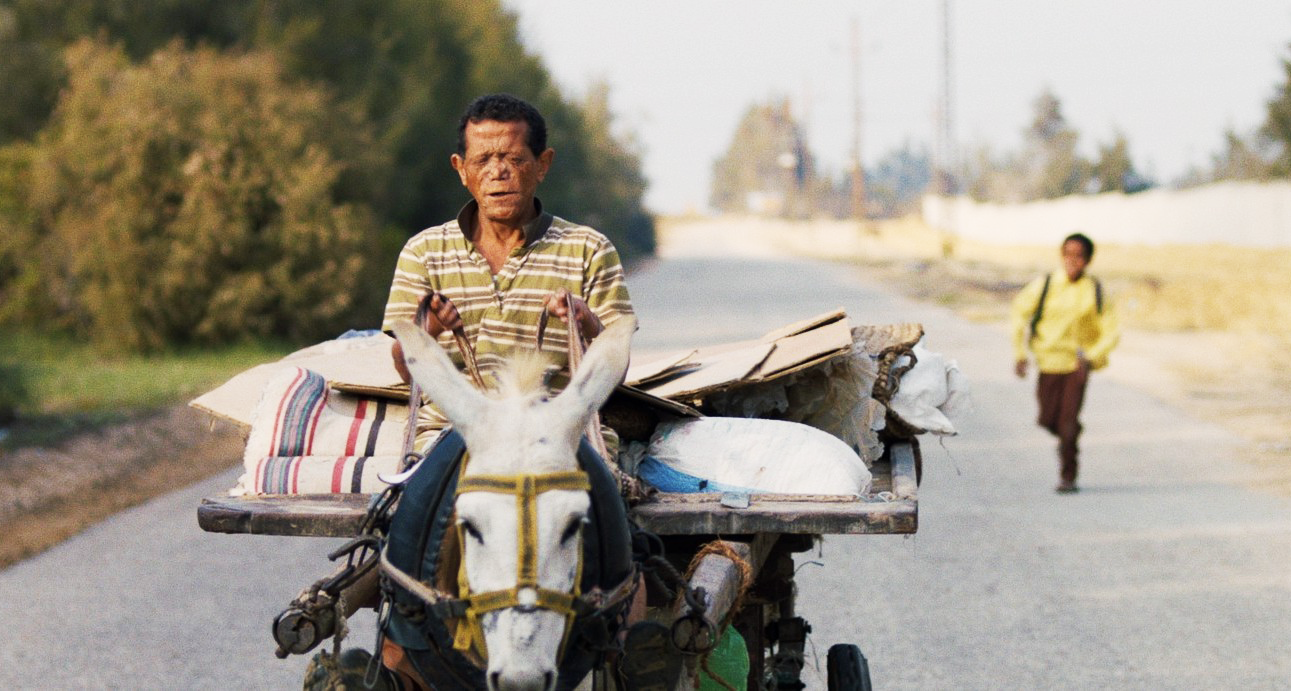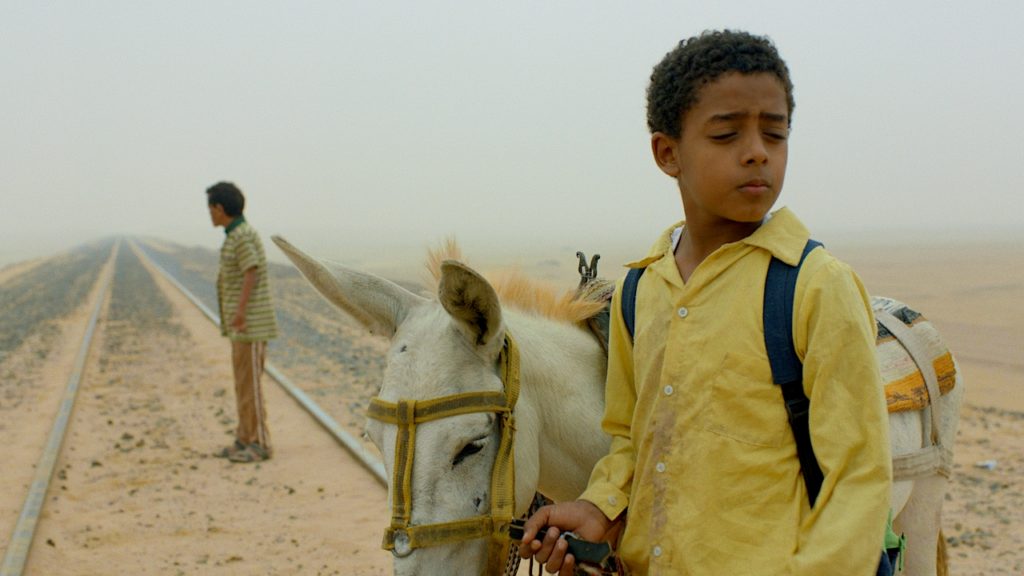
Sometimes, all it takes is a promise unfulfilled. Or else a wish unanswered. It isn’t unusual to feel an urge to give it all up and set out to tick that life-altering checkbox. Director A.B. Shawky’s Yomeddine makes us meet the middle-aged leper Beshay (Rady Gamal), living somewhere in Egypt. He has nobody to wait for once he loses his wife to mental illness. He lives in a leper colony and makes a living by rag-picking. His immediate world is compassionate as to what might be out of his circumference. Perhaps, it is a certain level of naivety or it could be an urge for a closure. It might as well be the plain impulse to travel, to breath in like a normal human being. Whatever be the reason, Beshay sets off on a road trip atop his donkey cart. Giving him company is a teenaged orphan (Ahmed Abdelhafiz), whom he fondly calls Obama – named after the “man on the television”.
Feel-good is the second skin to Yomeddine. For a title that translates to ‘the judgement day’, the lead characters often quiz each other on what will happen to one during that crucial event. It feels as if there exists an intense fear in Beshay for not doing what he was born to do. Meeting his biological family is of utmost importance to him as he precisely remembers his father’s last words. (There is a startling flashback scene to prove this point.) For young Obama, knowing his real name or his background is not a matter of significance. He is used to his habit of living in orphanages, often transferred from one to another. Obama doesn’t think twice before accompanying Beshay on this rather risky trip. From the way Yomeddine sets both characters up, it is clear that there’s nobody else other than Beshay that Obama possibly cared for.
ALSO READ: ‘The Other Side of Hope’ review – about hatred, humanity, and a little humour
Running close to 100-minutes, the initial few reels of the film are spent in setting up the world that Beshay confidently thrives in. It is not one of the most vibrant corners of Egypt. Set in a sparingly populated district, the sequences radiate a definite sense of loneliness though not of suffocation. A leprosy survivor, Beshay does not possess the most pleasant of faces. Still, he gets the customary kiss from everyone present at his wife’s funeral. It could be their recognized way of compassionate living or plainly the fact that they are all used to Beshay’s presence. For him to step out of this arc of comfort was a bold decision, which is something that I questioned for a long time in the film’s runtime.
Yomeddine sees its lead characters embark on an arduous journey. They travel by a donkey cart, they hitch-hike, they get entrapped amid thugs, and they get caught by the cops. The question arises on why someone as practical as Beshay didn’t consider taking a less bothersome trip, possibly by rail. Of course, the answer is that the film needed to have its ‘moments’ where the characters experience a range of events and emotions, though not exactly in the coming-of-age zone. Then again, somewhere deep within, the film’s simplicity feels a wee bit manufactured. There is this moving scene where something untoward happens to Obama and later to the donkey. Didn’t Beshay presume these occurrences in advance? For once, it never feels as if he were an absolute simpleton. He was clever enough to decipher the need to cover his face with a veil that hung loosely from his hat. Beshay knows that the world was insensitive and will never embrace him with all its heart. Therefore, it was a little astonishing to see the film set up each of its challenges, brick by brick, only to force its characters to experience them and eventually elicit certain emotions in the viewers.

Yomeddine gets a lot better towards the final act. The chapter with the beggars – who are outcasts of another kind – was heartwarming and a lot less manipulative. My favourite was the heartbreaking moment where Beshay yells at a ticket collector on a train, “I am a human being, I am a human being,” It is a staggering scene that hits you right in the gut. Later, there is an instance that exposes how different Beshay is from his companion, Obama. Along with the beggars, the duo happens to discover some of the little lad’s documents. Obama is least interested in knowing his real name or his parent’s particulars – contrasting sharply with Beshay, whose purpose behind this trip is a reunion with his long-lost family.
One that is set up on a highly predictable foundation, Yomeddine interestingly proves itself to be a sensitive and religiously aware fare. A Christian by faith, Beshay understands how humanity is beyond all. Towards the end, there is a touching passage where he seeks solace in a mosque – a place where he isn’t judged or is treated as an untouchable. Wonderfully staged inside the place of worship and later at Beshay’s ancestral residence, the pre-climactic sequence gives Yomeddine the much-needed emotional heft as it successfully convinces us of the character’s motivations. Even though we see it coming from a distance, Beshay’s act of liberation from atop a train during the climax is very well-conceived. Director A. B. Shawky draws a finite line that separates two worlds – one that is accepting and the other that is miles away from getting there.
ALSO READ: 30 World Cinema Titles from 2019 That Must Not Be Missed
While the trajectory that its characters undertake is a little too clichéd in parts, Yomeddine is habitually saved by Gamal who is sensational as Beshay. There isn’t a single false note in the man’s deeply affecting performance as he makes us a participant in his journey. It is a rarity to witness a character’s trajectory becoming such a personal affair to a viewer. His co-star Abdelhafiz is equally compelling as he quietly balances his organic innocence with an assured sense of self-awareness. Shot almost entirely on a handheld camera, the photography (Federico Cesca) becomes an able companion to the duo’s difficult journey. Quite often in the narrative, the still frames and intense close-up shots seem to understand the film’s universe a lot better than its screenplay does. The original score (Omar Fedel) which holds firmly onto its signature tune is heartwarming. Dialogues emerge from a familiar space and even on occasions that they turn dramatic, Yomeddine knows where to hit the brakes.
As it concludes on a profoundly satisfying note, A. B. Shawky’s film does not feel as original as it wants to be. Yes, it is innovative that his screenplay dissects a leper’s psyche but an outcast stumbling upon the world’s hurtful reality nothing new – especially for those who are acquainted with international cinema at large. However, the relieving angle here is that a lot of the film’s goodness and enormously optimistic temperament do not come across as force-fit. Beshay and Obama’s journey makes you embrace the need to be empathetic and spreads the message on how there is space for each one of us to thrive in this big, bad planet. In its brief run-time, Yomeddine spreads optimism and packs in a bunch of heartwarming moments originating from a highly organic space. Now, isn’t that a rarity in contemporary feel-good genre, may I ask?
Rating: ★★★ 1/2

